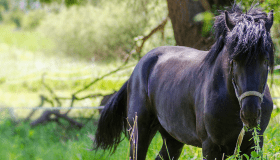
September 9, 2021 – Linking animal behavior to animal health might seem like a new idea, but Dr. Mark Morris Sr., our visionary founder, recognized the connection in the early 1950s. The Foundation funded its first animal behavior study on canine cognitive decline in dogs in 1956 and has been a leader in animal behavior studies for decades.
Since then, we’ve supported behavioral studies to help improve pain management in multiple species; reduce disease and stress in shelter animals; and increase our understanding of stress-inducing environmental factors, such as land use and human-generated noise, on wildlife.
Here’s a sampling of what some of our researchers are working on today:
According to recent surveys of cat owners, approximately 28% of cats 11-to-14 years old, and over 50% of cats aged 15 years or older, show behavior changes and cognitive decline. Our funded researchers want to know if low-grade, chronic inflammation (as measured by specific blood markers and physical changes) affects the quality of life and cognitive performance of older cats. With the lifespan of our cats increasing, it’s important to learn ways to keep their mental facilities sharp as they enter their senior years.
Imagine yourself in a noise-filled room, trying to talk to your friends so they understand what you are saying. Human-generated noise also affects animal communication, making it harder for animals to communicate and find each other. Our funded researchers are studying how the acoustic environment of zoos alters vocalizations in captive-bred frogs, a conservation concern for when these frogs are released into the wild and find themselves unable to communicate with their kin.
Other ongoing human-generated noise studies are looking at how urban sound affects the reproduction of crickets and other insects (important animals in the food chain), and how underwater ocean noise is changing the behavior of endangered dolphins.
What does parasite research have to do with gorilla behavior? Great apes are gregarious animals, living in family groups. Learning more about how gorillas interact, behave and move between family groups may provide valuable information on parasite transmission and other disease-causing agents that threaten great apes.
Another research project is focused on the behavior of wild hyenas infected with the parasite Toxoplasma gondii. This parasitic disease can affect the brain, possibly leading to increased risk-taking behavior in young animals – with disastrous consequences!
Horses
Two new behavior studies are underway to improve the health and welfare of horses. The first study is aimed at helping owners better recognize behaviors that may indicate osteoarthritis pain in their horses, to improve early detection and pain management. The second study is focused on reducing stress and increasing safety during transport of unbroken (unhandled) horses.
Mules, a crossbred of a donkey and horse, are increasingly popular companion and work animals. Our funded researchers are working to define behavioral signs of pain in mules using a facial expression scale and a new technology called Smart Halter™. This information will help veterinarians better care for these animals as more mules are seen in clinics and hospitals.
This species is one of the most heavily, illegally trafficked animals on the planet and yet we are only beginning to understand their health needs to release them safely and successfully back into the wild. Researchers are developing a health and behavior assessment tool to help distinguish rescued, healthy pangolins that would be good candidates for quick release, from rescued pangolins that may require more intensive care.
SNEAK PEAK AT WHAT’S NEXT
Morris Animal Foundation continues to lead the way in recognizing how behavior provides a window into the overall health and well-being of animals. Over the next year, we will fund more horse behavior health studies, thanks to the generosity of a veterinarian donor who echoes our sentiment that more research is critically needed in this area to help horses. We also are funding research into our behaviors as pet owners trying to figure out if we are contributing to the pet obesity epidemic, as well as learning more about how our behavior during the pandemic has influenced our cats’ behavior.
Behavior research isn’t new for the Foundation, but it certainly is taking off as a critical, underrecognized area of study so we can take better care of our animals. This work is only possible with support from generous donors like you!

STAY IN THE KNOW
Sign up for our emails and get the latest animal health news straight to your inbox.




